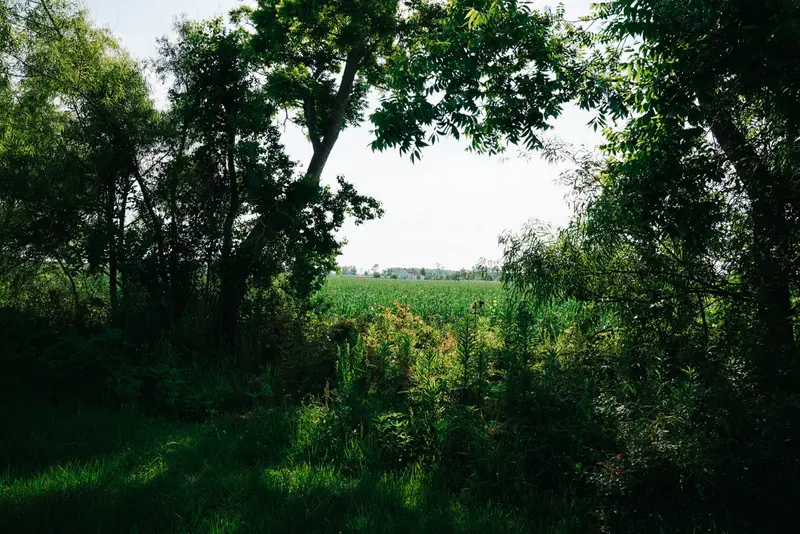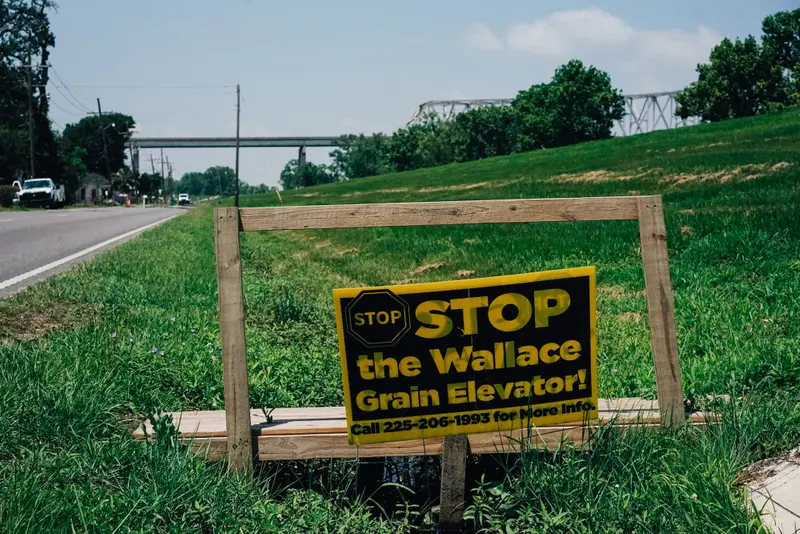For the second time in six months, a federal agency reprimanded a Louisiana developer for its failure to offer an adequate assessment of the harm that its proposed $400 million agricultural development would cause to neighboring Black communities and historic sites.
In a forceful letter dated Dec. 23, the U.S. Army Corps of Engineers rejected claims by the developer, Greenfield LLC, that its massive grain transfer facility in St. John the Baptist Parish upriver from New Orleans will have “no adverse effects.” The Corps is considering a permit application by Greenfield to build on federally protected waters and has the power to halt the project.
This is the second time the Corps has intervened.
In May, ProPublica revealed that a whistleblower had raised alarms about the project after the report she drafted on behalf of Greenfield — concluding that the facility would inflict damage on communities and historic sites — was gutted by the consulting firm where she worked to exclude any mention of that harm. In response to that story, the Corps deemed the drastically edited archaeological and historical survey “insufficient” and ordered Greenfield to produce a new report.
That new report, which the Corps received in November, did not address the agency’s demand that the developer conduct a more complete assessment of how the project could damage historic sites and harm residents of nearby towns, according to the Corps’ December letter.
“The report,” the letter reads, “just doesn’t demonstrate adequate engagement and that must be rectified.”
A Greenfield spokesperson said in a statement that “we and our team of respected expert consultants have done thorough evaluations to consider any and all potential impacts.” The statement went on to say that “Greenfield takes seriously its responsibility to provide regulatory agencies with accurate and complete information consistent with the regulatory requirements.”
The Corps’ letter criticizes Greenfield and its contractors for failing to meaningfully consult with people whose lives would be impacted by the dozens of looming grain silos, new rail, truck and shipping traffic and pollutants from the facility. It says Greenfield and its consultants have not done enough to account for the ways that the development project might harm communities of color, a requirement under federal environmental justice standards.
“It’s very disappointing that they would continue to double down on the report, that they are still saying there will not be any detrimental effects,” Erin Edwards, who blew the whistle on the earlier report, told ProPublica in a recent interview. Edwards co-authored the first version of the report when she worked as an architectural historian for Gulf South Research Corporation, the for-profit cultural resources and archaeological consulting firm that had been hired by another of Greenfield’s consultants to conduct a federally required assessment of historic sites.
Edwards resigned in late 2021 after her report was stripped of every mention of possible harm to communities or cultural properties, including her conclusion that the area surrounding the development should be listed as a historic district because of its connection to histories of slavery. In internal Gulf South emails obtained by ProPublica, a company manager wrote that it would lose its contract for the report — and could lose future work — if it didn't change the findings.
“Gulf South knew all along that the project would have an adverse effect on the historic plantations there, and they knew that it would have an adverse effect on the area as a whole,” Edwards said. “There’s no way to look at the evidence and not see that it’s going to be detrimental.”
Gulf South, which did not respond to questions about the new report or the Corps’ response letter, had earlier told ProPublica that it stood by the edited report and that Edwards’ version had been nothing more than a draft. Ramboll LLC, the consulting firm Greenfield hired to clear permitting hurdles and had in turn contracted Gulf South, also did not respond.
In response to the Corps’ recent letter, Ramboll said in a letter of its own that it and its client have consulted with community members and local groups. The company cited meetings between Greenfield and members of the environmental justice group Rise St. James, including the group’s founder, Sharon Lavigne. Ramboll’s letter claimed that Rise St. James “expressed support for Greenfield and its engagement approach.”
But when contacted on Friday, Lavigne told ProPublica that she said no such thing.
“I am not in favor of it. I oppose it,” Lavigne told ProPublica. “I don’t know how the writing got changed around to say that I support the grain elevator.”
When asked about the inconsistency, a Greenfield spokesperson told ProProPublica in an email, “There was an error in the characterization which has been corrected, and we’ve apologized to Rise St. James for the error.”
Greenfield added that the response by the Corps and the community to the new report “helps to make a good project even better. In areas where more information will help the Corps understand what we've proposed, we'll provide it.”
The Greenfield grain facility has been the target of sustained pushback from nearby communities, civil and human rights groups and historic preservation organizations, as well as from other federal agencies, including the Advisory Council on Historic Preservation, which oversees federal preservation policy. The land where the development is planned sits beside the Whitney Plantation Museum, which serves as a memorial to people who were enslaved in Louisiana. One plot of land down the river is another unusually well preserved plantation designated as a National Historic Landmark.

The Corps is also asking questions about the impact that the Greenfield development will have on existing communities. In its letter, the Corps asks Greenfield to more rigorously account for the grain facility’s likely impact on Wallace, a small, nearly all-Black rural community that sits directly beside the planned construction.
“Wallace will be directly impacted by the proposed action,” the letter said, adding that other federal agencies, including the National Park Service and the Advisory Council on Historic Preservation, have urged the Army Corps “to ensure that the community of Wallace is considered in the evaluation of the permit decision.”
Because the project would be built on federally protected waters, including wetlands and the Mississippi River, Greenfield had to apply for a permit from the Corps. Before it can grant the permit, the Corps has to enforce provisions of the National Historic Preservation Act.
“What we feel is that Greenfield intentionally ignored people in our community, that they just moved ahead without us,” said Joy Banner, who lives in Wallace and is the co-founder, along with her sister Jo Banner, of a group called the Descendants Project. The group supports communities whose members trace their ancestry to people enslaved in the region. “Now the Corps is backing that up,” she said. “The Corps is saying, ‘You did not talk to them about cumulative impacts, and the information that you provided is not consistent with the actual impact that a massive grain terminal would have.’ The story they offered is not adding up.”
In response to ProPublica’s reporting last year, the Advisory Council on Historic Preservation raised concerns about Greenfield’s plans. In an interview, Sara Bronin, the agency’s incoming chair, said that federal agencies like the Corps need to hold developers and their consultants accountable when they don’t follow the law.
“There should be an alignment between environmental justice, equity and historic preservation,” Bronin said. “Especially in communities that have lacked power, that have been underrepresented in our histories, we must be more cognizant about and motivated to address the historical injustices that people still feel very deeply today.”





